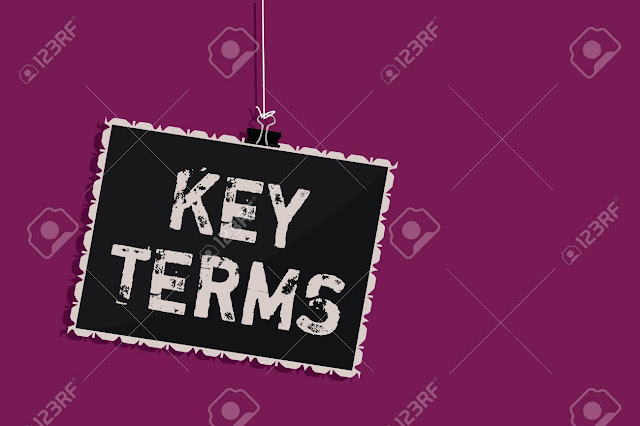Essential Banking Term-Part 1
1. Financial Institution =A financial institution established under the prevailing laws with the objectives of providing loans for agricultural cooperative, industrial or any other specific economic purpose or of collecting deposits from the general public .
2.
Money = It means all types of currency notes, postal orders,
postal notes, money orders, cheques, drafts, traveller’s cheques, letters of
credit, bills of exchange, promissory notes and credit cards and this
expression also includes similar types of monetary
3.
Currency Note = It means the bank note in circulation in the
form of cash and this expression also includes coin.
4.
Foreign Currency = It means the currency other than the
Nepalese currency and this expression includes the special drawing rights on
the International Monetary Fund, the Asian Currency Units, the European
Currency Units and other instruments as the Central Bank may prescribe.
5.
Foreign Exchange = It means foreign currency, all types
of deposits, credits, stocks, foreign securities payable in foreign currencies
and the cheques, drafts, traveller’s cheques, electronic fund transfer, credit
cards, letters of credit, bills of exchange, promissory notes in international
circulation payable in foreign currencies.
6.
Foreign Exchange Transaction = It means the acts of purchase
and sale of foreign exchange or the acts of borrowing, giving credits, and of
accepting or providing foreign exchange in any manner whatsoever, and this
expression also includes the act of granting approval for foreign exchange by
the Central Bank
7.
Letter of credit = It means an instrument issued by a
bank to another bank instructing to accept Cheque, draft, hundi or bill of
exchange drawn by specified person up to the limit of specified amount.
8.
Negotiate = It means the act of transferring an instrument to
any person having the right to hold negotiable instruments enabling him/her to
become a bearer.
9.
Negotiable Bill of Exchange= It means letter of credit,
bill of exchange or cheques.
10. Bill of Exchange= It means
an unconditional order in writing, addressed by one person to another, signed
by the person giving it, requiring the person to whom it is addressed to pay on
demand, or at a fixed or determinable future time, a sum certain in money to or
to the order of a specified person or to bearer.
11. Promissory note= It means an instrument signed by a person with an
undertaking to pay, without any condition, a fixed amount to any particular
person referred to in such instrument or to the person ordered by such person
or to the bearer of such instrument on a fixed date or on demand.
12. Cheque= It means a bill of
exchange drawn on any bank ordering it to make payment on demand.
13. Credit = It means a direct
or indirect promise to invest money and the right to recover such amount of
investment in return and the interest of such credit or payment of other
charges, the refinance given against the security of credit or investment
restructuring and renewal of credit, the guarantee made for repayment of credit
or any other promise for such repayment, and this expression also includes any
type of debt.
14. Credit security = It means
any bill of exchange of indebtedness and any other instrument equivalent to
such instruments of indebtedness, whether in certified or in book entry form.
15. Licensed Institution= It
means a bank or financial institution which has obtained a license pursuant to
this Act for carrying out banking or financial transaction.
16. Net worth= It means any
amount that remains after deducting the external liabilities from the grand
total of the assets to be maintained in the balance-sheet of a bank or
financial institution.
17. Current account= It means an
account of funds deposited with a bank or financial institution by a costumer
that may be withdrawn at any time on demand.
18. Paid-up Capital= It means
the portion of the capital paid up on behalf of shareholders out of the issued
capital of a bank or financial institution.
19. Risk-weight asset
(RWA) = It means the total assets
calculated by multiplying the amounts coming under each heading of on-balance
sheet and off-balance sheet operations of a bank or financial institution by
the risk-weight in the format as prescribed by the Nepal Rastra Bank.
20. Liquid assets = It means the
cash balance of a bank or financial institution, the balance remained in the
current account, the balance maintained in the Rastra Bank and such assets of a
bank or financial institution specified as liquid assets by the Rastra Bank
from time to time.
21. Articles of
Association (AOA) =It means the Articles of Association of a bank or financial
institution framed pursuant to the prevailing laws relating to companies.
22. Memorandum of
Association (MOA) = It means the Memorandum of Association of a bank or
financial institution framed pursuant to the prevailing companies’ law.
23. Deposits= It means and
includes amounts deposited in current, savings or fixed accounts of a bank or
financial institution through costumers with or without.
24. Capital= It means the
authorized capital, issued capital and paid up capital of a bank or financial
institution.
25. Capital Fund= It means
and includes the total sum of primary capital and supplementary capital of a
bank or financial institution as specified by the Nepal Rastra Bank and also
any other fund or amount as specified by the Nepal Rastra Bank from time to
time.
26. Primary Capital= It
means and includes the funds of a bank or financial institution listed under
such headings as the paid-up capital, share premium, non-redeemable preference
shares, general reserve fund and accumulated profit and loss.
27. Savings Account= It means
accounts containing details of the amounts deposited by any customer for
savings in a bank or financial institution.
28. Liquidator= It means
and includes a person appointed for carrying out the functions of liquidation
of bank or financial institution according to an order of a court or a
resolution adopted by a meeting of the creditors and as well as an office
carrying out the function of a liquidator.
29. Off-balance-sheet
transaction = It means and includes letters of credit, letters of guarantee,
letters of acceptance, commitments, swaps, options and transaction in advance
concerning foreign exchange having, the potential of bearing liabilities by a
bank.
30. Electronic transaction = It
means and includes the business of accepting deposits, making payments and transferring
funds through telephone, telex, computers or magnetic tapes or other electronic
equipment of a similar nature and transactions to be carried out through
terminal, automated teller machines and cash dispensing machines, as well as
those to be carried out through charge cards, debit or credit cards.
31. Creditor= It means and
includes a person or a body corporate to whom/which a bank or financial
institution has to pay and also a depositor and debenture-holder for the
purpose of liquidation process.
32. Hypothecation Loan = It
means a loan disbursed having entered into an agreement between a bank or
financial institution and a Borrower against the collateral security of the
stock having retained such stock under possession of the borrower concerned.
33. Doubtful Transactions= It
means transactions appearing improbable economically, commercially or by
business in general situation.



Comments